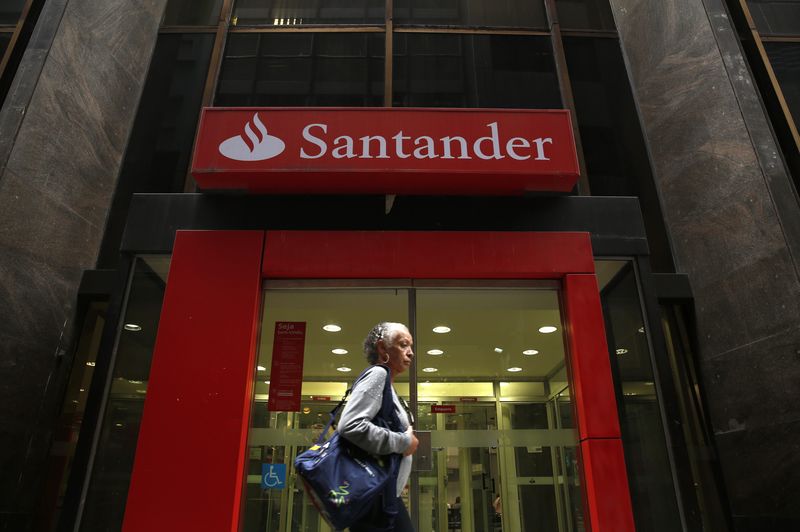By Sarah White and Jesús Aguado
MADRID (Reuters) - Spanish bank Santander (MC:SAN) posted a sharp fall in fourth-quarter net profit on Wednesday, hit by a mis-selling compensation bill in Britain and slowing income in Brazil, two of its most important markets.
The bank, which has long been under scrutiny over its capital ratios, showed progress on this front, however, with ratios under the strictest criteria nudging up to more than 10 percent, meeting Santander's targets.
Santander shares were down 1.2 percent at 3.94 euros by 1103GMT. The stock has lost a little more than 34 percent in the past year, against a fall of close to 16 percent for the European banking sector (SX7P).
The euro zone's largest lender by market value posted recurring group profit that was stable compared with the same period a year earlier, coming in at a slightly worse than expected 1.46 billion euros ($1.6 billion).
But including one-off charges of 1.44 billion euros, net profit was only 25 million euros, down 98 percent.
Compensation for British customers mis-sold payment protection insurance (PPI) accounted for almost half of the hit, the rest being writedowns on intangible assets. It is by no means alone in suffering a PPI hangover, with rival Royal Bank of Scotland (L:RBS) also taking extra fourth-quarter provisions.
Several analysts made positive noises about Santander's improving capital ratios, which Chairman Ana Botin wants to lift above 11 percent by 2018.
The bank has lagged behind European peers such as Deutsche Bank (DE:DBKGn) and Barclays (L:BARC) in terms of capital measured according to fully-applied Basel III rules.
CAPITAL CAUTION
Yet some analysts said that the bank could find it difficult to achieve Botin's aim of building capital through profit growth.
"We continue to believe the capital position will weigh on the bank's valuation, with this quarter's one-offs reminding us of the difficulties in generating capital through earnings," Credit Suisse (VX:CSGN) analysts said in a note to clients.
Botin said the bank was on track to meet targets without resorting to raising new equity.
"I want to stress we do not need to, and we're not going to, raise capital and we're not planning to sell assets," she said on a conference call with analysts.
A senior source at Santander told Reuters that the reluctance to consider asset sales extends to the bank's U.S. business, which has previously been mooted by some investors as a potential disposal.
For the year as a whole, Santander's net profit rose by 2.7 percent to 5.97 billion euros, driven down by the fourth-quarter one-offs and the slowdown in Brazil, which accounts for 19 percent of earnings.
Grappling with the worst economic downturn in decades, Santander's Brazil business posted fourth-quarter net profit down 12.2 per cent year on year, with profit also down on the previous three months.
Depreciation in the South American country's currency hurt income when translated into euros while provisions against potential bad loans in Brazil also rose from the previous three months. Botin said profits in Brazil would improve in 2016, adding that the bank is focussed on lending to lower-risk clients.
Group profit has bounced back after a deep downturn in the Spanish lender's domestic market three years ago, thanks largely to growth in its emerging market businesses.
Bad debts across the bank as a whole are declining, reaching 4.36 percent of total credit by the end of December, down from 4.5 percent three months earlier.
But like its Spanish peers, Santander is still having to contend with the margin-squeezing effect of low interest rates.
Net interest income, or profit from loans minus funding costs, reached a higher than expected 7.89 billion euros, up 2.3 percent from a year earlier, with momentum in Britain helping to offset a 16 percent decline in Spain.
($1 = 0.9200 euros)
